an interview with Derval Dunford, creator of the meditation CD Sui
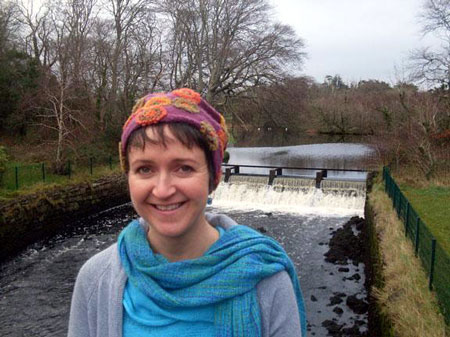
© Daithí Turner
Derval Dunford was born in Castlebar, County Mayo, in the west of Ireland and has been self-employed as a beautician for thirteen years. She holds diplomas in Aromatherapy, Hypnotherapy, Stress Management, certificates in Counseling Skills, Mindfulness Based Stress Reduction Teaching (MBSR), Dream Therapy and has attended several meditation retreats in Ireland and the U.K. Her professional training and personal “gra” (love, in Irish) for meditation are behind her successful new meditation CD “Sui.”
Julie Laffin, a performance artist from Chicago, and Julie Genser, founder of PlanetThrive.com, talked to her about how she used meditation and mindfulness techniques, among other lifestyle approaches, to heal from trauma and to overcome the limitations of chemical sensitivity (also referred to as MCS).

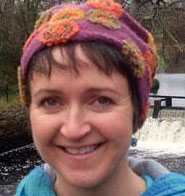 DD: Just before my 18th birthday my father, mother, younger brother and I were involved in a fatal car accident. My father was killed instantly, my mother and I were injured quite badly, and my brother to a lesser degree.
DD: Just before my 18th birthday my father, mother, younger brother and I were involved in a fatal car accident. My father was killed instantly, my mother and I were injured quite badly, and my brother to a lesser degree.

 DD: At that time in Ireland there was very little counseling available, so we just “got on with it.” I didn’t cope very well and I had no idea what was wrong. I was in University at the time and I did not know what grief was supposed to feel like, but I felt isolated and depressed. I feel like it’s all a bit of a blur really. I eventually went to see a psychiatrist when I was about twenty. I attended his clinic for a few years and was treated with medication. Eventually the depression lifted and I emerged a much stronger person.
DD: At that time in Ireland there was very little counseling available, so we just “got on with it.” I didn’t cope very well and I had no idea what was wrong. I was in University at the time and I did not know what grief was supposed to feel like, but I felt isolated and depressed. I feel like it’s all a bit of a blur really. I eventually went to see a psychiatrist when I was about twenty. I attended his clinic for a few years and was treated with medication. Eventually the depression lifted and I emerged a much stronger person.

 DD: I have no doubt that the shock my body received as a result of the car accident and my father’s sudden death had a huge impact on my health. I can’t say if it had any specific influence on the MCS, and I can’t say exactly how it impacted my health, I just know it didn’t do me any favors!
DD: I have no doubt that the shock my body received as a result of the car accident and my father’s sudden death had a huge impact on my health. I can’t say if it had any specific influence on the MCS, and I can’t say exactly how it impacted my health, I just know it didn’t do me any favors!

 DD: I worked in a hair and beauty salon for a couple of years before I opened my own business. I used a wide range of chemical products during my time there but the only one that I found difficult to be around was hairspray.
DD: I worked in a hair and beauty salon for a couple of years before I opened my own business. I used a wide range of chemical products during my time there but the only one that I found difficult to be around was hairspray.
In hindsight there was a glimpse of sensitivity when I was in my early twenties. I worked in a shop that sold a lot of potpourri, there were several big open baskets of the stuff in the shop at the time. I did have trouble with itchy runny eyes for a period of time from that but it cleared up.
In my own business I’ve always preferred a more alternative or natural approach where possible, but having said that I’ve always also used the regular salon products such as nail varnish, false tan, etc. I never had a problem with any of them until around 2002 after my first acute exposure, which was with a fixer spray that I was using for my work as a make-up artist. Even after that my sensitivity was still very limited and there were only a couple of products that overpowered me. But with a mask and the window open I managed fine. I still had no idea what was happening. I had never heard of MCS.
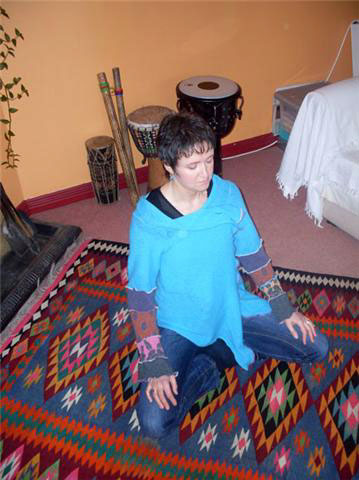
© Daithí Turner

 DD: I had started “attempting” to meditate quite some time ago. It must be more than ten years ago that I attended my first meditation course. At that time I couldn’t sit for two minutes! I found it quite impossible and didn’t practice at home while attending the course (even though the teacher had emphasized that the most important thing was to practice even for five minutes a day) but for some reason I still went back and did the course again. I just felt there was something in it. For years after that I did bits and pieces, meditation weekend retreats and I attended different weekly guided sessions to keep up the motivation and to learn more. I began to do some practice at home but it was more just an attempt to make myself sit still. I was a very busy person, always on the go, busy in mind and busy in body, always thinking, always doing.
DD: I had started “attempting” to meditate quite some time ago. It must be more than ten years ago that I attended my first meditation course. At that time I couldn’t sit for two minutes! I found it quite impossible and didn’t practice at home while attending the course (even though the teacher had emphasized that the most important thing was to practice even for five minutes a day) but for some reason I still went back and did the course again. I just felt there was something in it. For years after that I did bits and pieces, meditation weekend retreats and I attended different weekly guided sessions to keep up the motivation and to learn more. I began to do some practice at home but it was more just an attempt to make myself sit still. I was a very busy person, always on the go, busy in mind and busy in body, always thinking, always doing.

 DD: I had studied a lot in the area of the mind/body connection and I felt it was going to help. When I was suffering with MCS, still wanting to be productive I decided to use meditation, relaxation and visualization in earnest and check out the results for myself. I was very worried about my ill health, whether I’d be able to work, socialize, or ever live a normal life again and all of this going on in my mind was exhausting. I felt if I could REALLY rest my body and mind it would help with my recovery. I was also finding it difficult to sleep at night so I hoped it’d be beneficial in that department too.
DD: I had studied a lot in the area of the mind/body connection and I felt it was going to help. When I was suffering with MCS, still wanting to be productive I decided to use meditation, relaxation and visualization in earnest and check out the results for myself. I was very worried about my ill health, whether I’d be able to work, socialize, or ever live a normal life again and all of this going on in my mind was exhausting. I felt if I could REALLY rest my body and mind it would help with my recovery. I was also finding it difficult to sleep at night so I hoped it’d be beneficial in that department too.

 DD: After my main acute exposure in November 2003, which was with oil paint for painting doors, everything changed. I became hypersensitive to it seemed everything chemically fragranced. My first symptoms were a severe migraine, nausea, and complete exhaustion. It felt like my body was falling apart. I had to give up work because I didn’t have the energy. I couldn’t come into contact with people wearing chemically fragranced products. Freshly washed hair, freshly laundered clothes, deodorant, perfume, aftershave, nail varnish, hairspray, body lotion…you name it. I found fabric softener, some washing powders, perfume, after-shave and some men’s deodorants affected me very badly.
DD: After my main acute exposure in November 2003, which was with oil paint for painting doors, everything changed. I became hypersensitive to it seemed everything chemically fragranced. My first symptoms were a severe migraine, nausea, and complete exhaustion. It felt like my body was falling apart. I had to give up work because I didn’t have the energy. I couldn’t come into contact with people wearing chemically fragranced products. Freshly washed hair, freshly laundered clothes, deodorant, perfume, aftershave, nail varnish, hairspray, body lotion…you name it. I found fabric softener, some washing powders, perfume, after-shave and some men’s deodorants affected me very badly.
In relation to other household and environmental triggers, I reacted quite badly to tar (if I drove past “road-works” where the workers were resurfacing a road). I found gas heaters and firelighters difficult. Scented candles, potpourri, cleaning products, washing-up liquid (lemon scented seemed to be worse for some reason) again, you name it. The symptoms were generally a muzzy head, sometimes nausea, fatigue and a chemical hangover in the morning. Those symptoms were common to all triggers. It’s hard to say how long I’d be affected for, it varied depending on what I had come in contact with, but I usually had to sleep it off, which did help a little.

 DD: I suffered from chronic fatigue and I became allergic to tomatoes, sensitive to wheat, dairy and alcohol. I had recurring sinus infections.
DD: I suffered from chronic fatigue and I became allergic to tomatoes, sensitive to wheat, dairy and alcohol. I had recurring sinus infections.

 DD: I knew one other person [in Ireland] at the height of my illness that suffered from MCS.
DD: I knew one other person [in Ireland] at the height of my illness that suffered from MCS.

 DD: I am fortunate to have friend who is a healer, it’s difficult to explain, but he just has a gift of healing. He helped to activate my own healing in my body by using hands on healing. He has been a great support over the years. I also adhered to a strict anti-candida diet for six months and to a lesser degree after the six-month period. I also avoided toxins and I took supplements, a variety at different times, and a good pro-biotic daily.
DD: I am fortunate to have friend who is a healer, it’s difficult to explain, but he just has a gift of healing. He helped to activate my own healing in my body by using hands on healing. He has been a great support over the years. I also adhered to a strict anti-candida diet for six months and to a lesser degree after the six-month period. I also avoided toxins and I took supplements, a variety at different times, and a good pro-biotic daily.
Over those years I also visited some other alternative therapists for advice and occasional treatments. I had some sessions of Jin Shin Jitsu, a sort of acupressure treatment that’s supposed to be helpful in clearing toxins. I had some sessions of vibrational kinesiology to help balance the body. I also practiced yoga most mornings as part of my routine, sometimes I just didn’t have the energy but I mostly tried to do a little gentle practice. I changed my diet to include as much good quality, natural, raw and living food as possible. I juice daily, some fruit but mostly green, organic vegetables. I grow and juice wheatgrass, which I feel has really helped my energy levels and my whole well-being.

 DD: At the moment I’m trying to take two shots a day of wheatgrass, two fluid ounces per shot minimum. Sometimes I take three to four fluid ounces, depending on how much grass I have. Two ounces is recommended to begin with, I think. I usually drink three quarters of a pint of cucumber, courgette, apple and celery juice, all organic.
DD: At the moment I’m trying to take two shots a day of wheatgrass, two fluid ounces per shot minimum. Sometimes I take three to four fluid ounces, depending on how much grass I have. Two ounces is recommended to begin with, I think. I usually drink three quarters of a pint of cucumber, courgette, apple and celery juice, all organic.
I have a shot of wheatgrass first, then the juice first thing every morning. I have without doubt noticed an increase in energy since I started this.

 DD: I try to eat more alkaline foods, to balance the body, from what I understand most of what we’d consider a normal everyday food is acidic. I sprout seeds and grains, I use them on salads and sometimes I add them to my juice. I bake my own spelt bread, I find wheat okay occasionally, but not everyday. I drink approximately two pints of good quality filtered water per day. All of the tea I drink, as I’ve mentioned above is herbal. I generally stay away from all refined sugar. I can’t say exactly how much difference the dietary changes made. To me, it’s impossible to judge. As I said earlier, nothing can be pinpointed for me, but it all helped. I go for a walk almost everyday, thirty minutes, rain, hail or shine and it’s mostly rain here! I do some meditation/visualization every day, at the moment twice a day. Sometimes just five minutes, sometimes thirty minutes, sometimes in bed before I get up and before I go to sleep, sometimes sitting in my front room on my meditation stool after drinking my juice. But I never miss a day.
DD: I try to eat more alkaline foods, to balance the body, from what I understand most of what we’d consider a normal everyday food is acidic. I sprout seeds and grains, I use them on salads and sometimes I add them to my juice. I bake my own spelt bread, I find wheat okay occasionally, but not everyday. I drink approximately two pints of good quality filtered water per day. All of the tea I drink, as I’ve mentioned above is herbal. I generally stay away from all refined sugar. I can’t say exactly how much difference the dietary changes made. To me, it’s impossible to judge. As I said earlier, nothing can be pinpointed for me, but it all helped. I go for a walk almost everyday, thirty minutes, rain, hail or shine and it’s mostly rain here! I do some meditation/visualization every day, at the moment twice a day. Sometimes just five minutes, sometimes thirty minutes, sometimes in bed before I get up and before I go to sleep, sometimes sitting in my front room on my meditation stool after drinking my juice. But I never miss a day.

 DD: I didn’t attend the doctor with the MCS. I felt there was nothing they could do and pills would do nothing for me as far as I was concerned because I was reacting to chemicals. With my sensitivity I had no intention of going near a hospital. I’d generally opt for an alternative way if possible in most situations. I didn’t look into the medical route so I really don’t know what’s available in Ireland for people suffering from MCS. I feel that the average person in the street here has no idea what MCS is. When I began suffering from those symptoms I got a contact number from a friend, for a man suffering with MCS, also in the west of Ireland. He gave me a lot of information regarding products and the importance of avoidance of chemicals which was very helpful at the time as I had never heard of MCS and found it difficult to comprehend.
DD: I didn’t attend the doctor with the MCS. I felt there was nothing they could do and pills would do nothing for me as far as I was concerned because I was reacting to chemicals. With my sensitivity I had no intention of going near a hospital. I’d generally opt for an alternative way if possible in most situations. I didn’t look into the medical route so I really don’t know what’s available in Ireland for people suffering from MCS. I feel that the average person in the street here has no idea what MCS is. When I began suffering from those symptoms I got a contact number from a friend, for a man suffering with MCS, also in the west of Ireland. He gave me a lot of information regarding products and the importance of avoidance of chemicals which was very helpful at the time as I had never heard of MCS and found it difficult to comprehend.

 DD: During that time I used meditation, visualization and relaxation daily. I still do.
DD: During that time I used meditation, visualization and relaxation daily. I still do.

 DD: The techniques that are on my CD are the basis of what I used. In the visualizations I got a sense of myself being well and full of energy. In the meditations I let go of my negative and fearful thoughts and practiced mindfulness. The body scan I found helpful to induce sleep, to clear my mind, to relax and reenergize my body.
DD: The techniques that are on my CD are the basis of what I used. In the visualizations I got a sense of myself being well and full of energy. In the meditations I let go of my negative and fearful thoughts and practiced mindfulness. The body scan I found helpful to induce sleep, to clear my mind, to relax and reenergize my body.

 DD: I find it difficult to pinpoint exactly how long it took to improve. It was a very gradual process. I’d say two years to get back to an acceptable level of tolerance, but still remaining pretty sensitive. Three years to get to what I’d regard as a good level of tolerance, being able to socialize, etc. It took a lot longer to get my energy back to a good, consistent level. This year I am very happy with the way my energy levels are. Mind you, I have high expectations in that department.
DD: I find it difficult to pinpoint exactly how long it took to improve. It was a very gradual process. I’d say two years to get back to an acceptable level of tolerance, but still remaining pretty sensitive. Three years to get to what I’d regard as a good level of tolerance, being able to socialize, etc. It took a lot longer to get my energy back to a good, consistent level. This year I am very happy with the way my energy levels are. Mind you, I have high expectations in that department.

 DD: It would be impossible to attribute a particular percentage of my recovery to my relaxation and meditation practice or to anything else that I’ve done. I feel each person is an individual case and different things work for different people. For me it was important to have background support: my friend ‘the healer’ whom I believe helped activate my own healing, the diet was a factor, particularly raw fresh nutritious foods, lots of greens, the juicing, the supplements, the probiotics, and more recently the wheatgrass. All of this helped clear my body of toxins and rebuild my immune system in my opinion.
DD: It would be impossible to attribute a particular percentage of my recovery to my relaxation and meditation practice or to anything else that I’ve done. I feel each person is an individual case and different things work for different people. For me it was important to have background support: my friend ‘the healer’ whom I believe helped activate my own healing, the diet was a factor, particularly raw fresh nutritious foods, lots of greens, the juicing, the supplements, the probiotics, and more recently the wheatgrass. All of this helped clear my body of toxins and rebuild my immune system in my opinion.
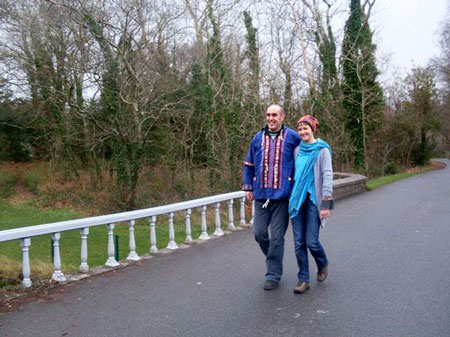

 DD: I don’t understand the mechanism behind MCS. I feel it’s like any other illness in ways. For me my body was out of balance, I had pushed myself for years. I never knew what it was to really rest and rejuvenate. My body was not nourished properly, because I ate a lot of processed foods, I was running on empty and my immune system was low. I worked with lots of chemically fragranced products for years, so between artificial chemicals in the food and the products I was overloaded. I feel the body can only cope with so much. I needed a break, my body and mind needed to be nourished. As dreadful and all as it was, it turned into a great opportunity for healing and learning. The relaxation and meditation practices were an emotional support, in the same manner, they helped detox my mind, REALLY rest my body and mind, and build up my immune system. For me it’s important to treat mind, body and spirit to achieve balance, not to separate one from the other.
DD: I don’t understand the mechanism behind MCS. I feel it’s like any other illness in ways. For me my body was out of balance, I had pushed myself for years. I never knew what it was to really rest and rejuvenate. My body was not nourished properly, because I ate a lot of processed foods, I was running on empty and my immune system was low. I worked with lots of chemically fragranced products for years, so between artificial chemicals in the food and the products I was overloaded. I feel the body can only cope with so much. I needed a break, my body and mind needed to be nourished. As dreadful and all as it was, it turned into a great opportunity for healing and learning. The relaxation and meditation practices were an emotional support, in the same manner, they helped detox my mind, REALLY rest my body and mind, and build up my immune system. For me it’s important to treat mind, body and spirit to achieve balance, not to separate one from the other.

 DD: My sense of smell is still quite acute, so I’m not back to the way I was before the MCS. There were lots of fragrances that I would barely have noticed then, that now just smell pure “chemical” to me. Having said all of that, I can socialize, I can travel on public transport, I can go on holidays, I can work, etc. I keep away from chemicals as much as possible—I always will. I use all-natural products, eat as much natural produce as possible, drink very little alcohol, no tea or coffee, only herbal teas, usually organic green. I really dislike all chemically fragranced products. Strong perfumes I move away from in social situations. It offends me but it doesn’t make me sick, thank God!
DD: My sense of smell is still quite acute, so I’m not back to the way I was before the MCS. There were lots of fragrances that I would barely have noticed then, that now just smell pure “chemical” to me. Having said all of that, I can socialize, I can travel on public transport, I can go on holidays, I can work, etc. I keep away from chemicals as much as possible—I always will. I use all-natural products, eat as much natural produce as possible, drink very little alcohol, no tea or coffee, only herbal teas, usually organic green. I really dislike all chemically fragranced products. Strong perfumes I move away from in social situations. It offends me but it doesn’t make me sick, thank God!

 DD: I work part-time from home at the moment. I do a limited range of treatments and I know most of my clients quite well, so a lot of them don’t wear perfume when they visit me—they got into such a habit while I was recovering that it’s automatic for them now. It’s great, they are very thoughtful and understanding.
DD: I work part-time from home at the moment. I do a limited range of treatments and I know most of my clients quite well, so a lot of them don’t wear perfume when they visit me—they got into such a habit while I was recovering that it’s automatic for them now. It’s great, they are very thoughtful and understanding.

 DD: I use natural products as much as possible. There would obviously be chemicals in some of the products I use but none are chemically fragranced. I choose not to use any nail colors or false tan products.
DD: I use natural products as much as possible. There would obviously be chemicals in some of the products I use but none are chemically fragranced. I choose not to use any nail colors or false tan products.

 DD: I don’t advise anyone on what to use or not use; I tell them about my experience and what I use, and after that it’s up to them.
DD: I don’t advise anyone on what to use or not use; I tell them about my experience and what I use, and after that it’s up to them.

 DD: Sui, my double CD plus step-by-step booklet, was created as a direct result of my recovery. I knew how much these meditation and relaxation practices helped me, so it gave me the courage and confidence to share them with others. My idea was to give a wide variety of options within different time frames, so that there is something for everyone. There are 5, 10, 15, 20 minute sessions, guided and non-guided, nine tracks in total. There is a specific option for encouraging restful sleep, a healing visualization, sitting meditations, silent meditations with soft tones of Tibetan bowls and a soothing instrumental piece. The CDs allow you to expand and extend your practice beyond the guided sessions but still within a time frame so it’s ideal for busy people. The guided sessions have specifically designed rest-inducing background music (co-composed and performed by my son Stephen). The Sui package is based on mindfulness, awareness on the present moment, non-judgementally.
DD: Sui, my double CD plus step-by-step booklet, was created as a direct result of my recovery. I knew how much these meditation and relaxation practices helped me, so it gave me the courage and confidence to share them with others. My idea was to give a wide variety of options within different time frames, so that there is something for everyone. There are 5, 10, 15, 20 minute sessions, guided and non-guided, nine tracks in total. There is a specific option for encouraging restful sleep, a healing visualization, sitting meditations, silent meditations with soft tones of Tibetan bowls and a soothing instrumental piece. The CDs allow you to expand and extend your practice beyond the guided sessions but still within a time frame so it’s ideal for busy people. The guided sessions have specifically designed rest-inducing background music (co-composed and performed by my son Stephen). The Sui package is based on mindfulness, awareness on the present moment, non-judgementally.

 DD: The booklet is quite informative regarding posture, the breath, mindfulness, the benefits of the practices and has lots of inspirational quotes.
DD: The booklet is quite informative regarding posture, the breath, mindfulness, the benefits of the practices and has lots of inspirational quotes.

 DD: The package is suitable for beginners as it is step by step. It is also suitable for those that are experienced in meditation. CD 2 is non-guided for those who like to practice their own particular meditation or their yoga postures within a specific time frame without clock watching. On CD 1 the body scan and visualization can be beneficial for both beginners and experienced practitioners.
DD: The package is suitable for beginners as it is step by step. It is also suitable for those that are experienced in meditation. CD 2 is non-guided for those who like to practice their own particular meditation or their yoga postures within a specific time frame without clock watching. On CD 1 the body scan and visualization can be beneficial for both beginners and experienced practitioners.

 DD: It is not tailored for anyone in particular but I’m hopeful that there is something for everyone. I do feel it would be very helpful for anyone suffering from anxiety, illness or recovering from illness, but also a perfect for “chill out” opportunity for busy people.
DD: It is not tailored for anyone in particular but I’m hopeful that there is something for everyone. I do feel it would be very helpful for anyone suffering from anxiety, illness or recovering from illness, but also a perfect for “chill out” opportunity for busy people.

 DD: The response to Sui has been amazing. There has been huge interest since it was released and so far we’ve received really positive feedback, as you’ll see from the testimonials [on the website].
DD: The response to Sui has been amazing. There has been huge interest since it was released and so far we’ve received really positive feedback, as you’ll see from the testimonials [on the website].
I have never actually said that Sui could heal anything, but I do know it can help hugely with stress and anxiety and bring balance to your life. From my own experience I feel there is a real need for balance. People are becoming very aware of this need right now and Sui is providing an easy way to achieve this in the comfort of your own home, even your own bed!

 DD: The CD’s can be ordered on line at www.sui.ie.
DD: The CD’s can be ordered on line at www.sui.ie.
 Julie Genser and Julie Laffin are friends who have joined forces in their research to find people who have improved their functionality after suffering from severe chemical sensitivity. Julie Genser runs the website PlanetThrive.com, a place for people recovering from chronic environmentally based illnesses. Julie Laffin is a Chicago-based performance artist currently working on transforming her work to embrace and transcend her health challenges.
Julie Genser and Julie Laffin are friends who have joined forces in their research to find people who have improved their functionality after suffering from severe chemical sensitivity. Julie Genser runs the website PlanetThrive.com, a place for people recovering from chronic environmentally based illnesses. Julie Laffin is a Chicago-based performance artist currently working on transforming her work to embrace and transcend her health challenges.







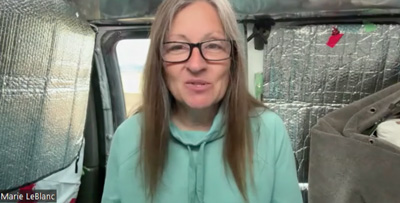

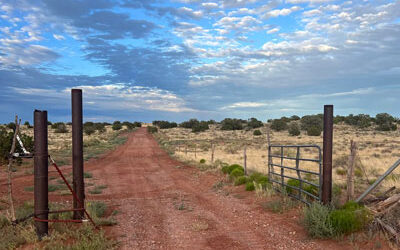
thanks so much for doing this interview J & J!
And thank you Derval for participating.
I bought the CD in the spring and I love the guided meditations. I have never enjoyed a guided meditation CD before and I have tried many. But I love this one :-)
Derval’s voice is so gentle and the words work well for me.
I have found myself actually having the urge to listen to the CD when I am stressed! (much better than the urge to eat junk food ;-)
Thanks.. Found this really helpful.